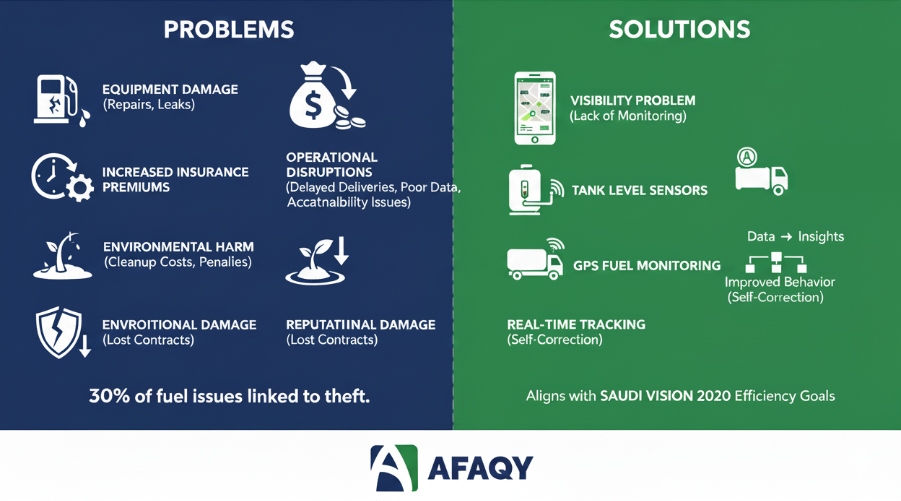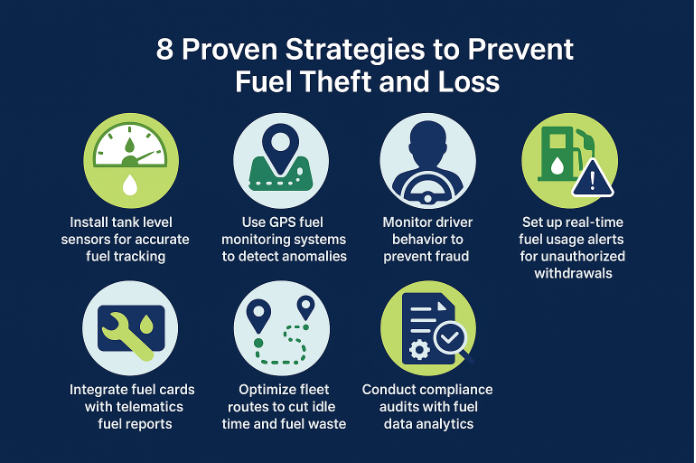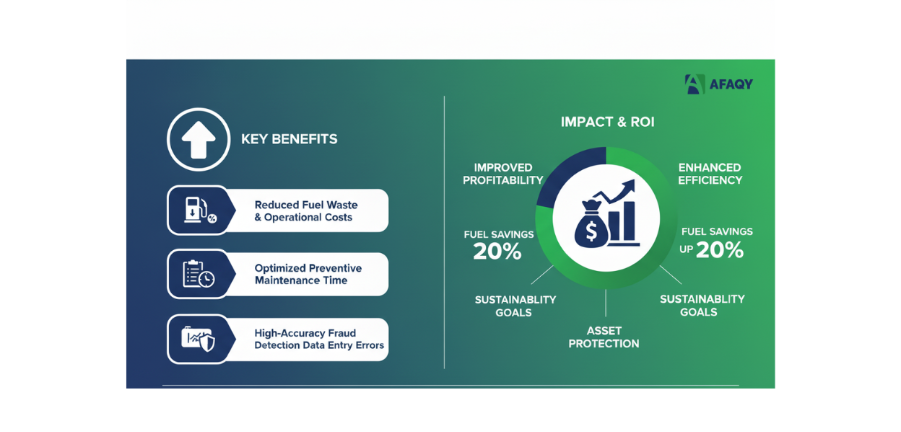Why Fuel Theft is Still a Big Risk for Saudi Fleets — And How to Stop It

Why Fuel Theft is Still a Big Risk for Saudi Fleets — And How to Stop It
Fuel theft in Saudi Arabia represents a significant yet often overlooked challenge for fleet owners. In fact, fuel disappears in numerous ways: drivers refueling personal vehicles, fuel being siphoned or drained, idling due to poor routing, and tampering with fuel cards or meter readings—often accounting for 5–15% in untracked fuel spend.
For the majority of fleets, fuel represents a significant portion of total expenditure, making this hidden loss particularly damaging to your business's bottom line.
Furthermore, fuel fraud can take many forms, including misreporting mileage, using company fuel cards for personal use, and even siphoning fuel directly from tanks.
This widespread issue poses a significant concern for businesses operating vehicle fleets, particularly in industries such as transportation, construction, and logistics, where fuel is a critical resource.
Consequently, the financial losses incurred due to fuel theft can be substantial, significantly impacting your operational costs and profitability.
It is often said that every problem has a solution — and fuel theft is no exception. Explore proven strategies to prevent fuel theft in fleets.
Table of Contents
- The Hidden Costs of Fuel Theft
- 8 Proven Strategies to Prevent Fuel Theft and Loss
- From Monitoring to ROI: Realizing the Benefits of Fuel Management
- Turning Fuel Management into a Competitive Advantage with AFAQY
The Hidden Cost of Fuel Theft in Saudi Arabia Fleets
While direct fuel losses are obvious, the true impact of fuel theft runs much deeper for Saudi fleet operations. Beyond the financial loss ratios that we already mentioned in the introduction, fleet owners face a cascade of hidden costs that silently erode profitability.
One overlooked expense is equipment damage. When thieves target your vehicles or storage facilities, they often damage tanks, pumps, and fuel systems. This leads to costly repairs and potentially dangerous fuel leakages that can create environmental hazards.
Additionally, these incidents may trigger increased insurance premiums, adding another layer of financial burden.
The operational impact is equally concerning. Undetected fuel theft disrupts delivery schedules and reduces overall fleet efficiency. This ripple effect extends to:
- Compromised client relationships and trust
- Inaccurate fuel consumption data leading to poor decision-making
- Difficulty in holding drivers accountable
- Higher vehicle maintenance costs over time
Moreover, environmental damage from fuel spills can have serious legal and financial repercussions. Many fleet owners don't realize they remain liable for cleanup costs and potential penalties even when theft is the root cause.
Perhaps most valuable is what you cannot see on a balance sheet—your business reputation. Almost 30% of fuel-related issues in distribution are linked to theft or unaccounted fuel loss.
Once your company becomes associated with environmental incidents or operational inefficiency, this reputational damage can extend for years, making it difficult to secure new contracts or partnerships.
The good news? This is primarily a visibility problem, not a behavioral one. Without proper monitoring systems like tank level sensors and GPS fuel monitoring, fleet managers are essentially operating blind.
However, once real-time tracking is implemented, patterns become visible, and behavior naturally changes. When drivers know their refueling and usage are being monitored, they self-correct, removing both the opportunity and temptation for theft.
For Saudi fleets looking toward Vision 2030's efficiency goals, addressing these hidden costs represents a significant opportunity to improve operational performance and sustainability.

8 Proven Strategies to Prevent Fuel Theft and Loss
Protecting your fleet from fuel theft requires a multi-faceted approach that combines technology, processes, and people. According to Countering Global Oil Theft: Responses and Solutions (UNU-WIDER, 2022), fuel theft represents about 5-7% of the global market for crude oil and petroleum fuels. Implementing these proven strategies can significantly reduce this costly drain on your resources.
1. Install Tank Level Sensors for Accurate Fuel Tracking
High-precision sensors continuously monitor fuel tank volumes with no blind spots, instantly detecting refilling and draining activities. According to a study from Tishreen University, advanced fuel measurement systems can achieve an accuracy margin as low as 0.75%, ensuring highly reliable real-time data on fuel consumption and making unauthorized fuel extraction immediately visible.
2. Use GPS Fuel Monitoring Systems to Detect Anomalies
Advanced GPS tracking combined with fuel monitoring detects sudden drops in fuel levels through visual representations. The system provides comprehensive details of theft incidents, including date, time, location, percentage stolen, and driver information, enabling swift investigation.
3. Monitor Driver Behavior to Prevent Fraud
Telematics systems track driving behaviors that impact fuel efficiency, including excessive idling or aggressive driving. This visibility helps identify patterns of potential internal fraud and creates accountability for proper fuel usage.
4. Set Up Real-Time Fuel Usage Alerts for Unauthorized Withdrawals
Instant notifications for fuel draining events can be sent via web, mobile, and email. You can set alarms to immediately warn both management and drivers whenever unauthorized draining takes place, allowing for immediate response.
5. Integrate Fuel Cards with Telematics Fuel Reports
This integration provides comprehensive visibility into vehicle health, driver behavior, and fuel usage. By combining GPS tracking with fuel card data, you can detect fraudulent activity, identify non-fuel purchases, and flag transactions where a vehicle wasn't present.
6. Optimize Fleet Routes to Cut Idle Time and Fuel Waste
Optimized routes can lower fuel costs by up to 20%. Advanced algorithms analyze real-time data, including traffic patterns, weather conditions, and delivery windows, to minimize unnecessary mileage and reduce idling time, which consumes a significant portion of fuel costs.
7. Conduct Compliance Audits with Fuel Data Analytics
Regular fuel audits help identify discrepancies between consumption and purchase records. Automated systems enable verification that receipts match reported transactions and that fuel use aligns with expected consumption based on distance traveled.
8. Apply Predictive Maintenance to Reduce Fuel Inefficiency
Predictive maintenance using telematics data provides substantial fuel savings by addressing issues that impact efficiency. Problems such as low engine oil, clogged fuel filters, and underinflated tires (which can decrease fuel economy by 2% for every 10 PSI of underinflation) are detected before they lead to excessive consumption.

From Monitoring to ROI: Realizing the Benefits of Fuel Management in Saudi Fleets
By applying the previously outlined strategies, companies operating fleets in Saudi Arabia can achieve tangible returns. Real-time monitoring and integrated telematics allow fleets to:
- Reduce wasted fuel and unauthorized withdrawals, directly improving fuel efficiency and lowering operational costs.
- Optimize preventive maintenance schedules to enhance vehicle performance and prevent unnecessary fuel consumption.
- Reducing compliance preparation time significantly, which helps save administrative effort and ensures regulatory adherence.
- Detecting potential fraud with high accuracy, enhancing oversight, and preventing financial losses.
- Protecting fuel resources and fleet budgets while eliminating approximately 95% of data entry errors.

Turning Fuel Management into a Competitive Advantage with AFAQY
At AFAQY, we offer comprehensive fuel management solutions designed to help fleet owners in Saudi Arabia:
- Gain full operational control: Track fuel consumption and driver behavior accurately.
- Enhance accountability:. Ensure every refueling and fuel usage is monitored, reducing opportunities for theft.
- Make data-driven decisions: Use sensor and GPS data to optimize routes and maintenance schedules.
- Align with Vision 2030 goals: Improve efficiency, safety, and environmental responsibility.
With these advanced systems, fuel management is transformed from a vulnerability into a strategic advantage. For more information, contact AFAQY today and make the most of every drop of fuel, turning it into a source of power, not loss.
FAQs
Q1. How can fleet owners detect fuel theft in their vehicles?
Fleet owners can detect fuel theft by installing tank level sensors and GPS fuel monitoring systems. These technologies provide real-time alerts for sudden drops in fuel levels, track fuel consumption patterns, and flag suspicious activities like unauthorized withdrawals or route diversions.
Q2. What are the hidden costs associated with fuel theft for Saudi fleets?
Beyond direct fuel losses, hidden costs include equipment damage, increased insurance premiums, disrupted delivery schedules, compromised client relationships, inaccurate fuel consumption data, and potential environmental damage. These factors can significantly impact a fleet's operational efficiency and profitability.
Q3. How effective are fuel management systems in reducing fuel losses?
Fuel management systems have proven highly effective, with some fleets reporting a 20-90% reduction in fuel losses. These systems combine technologies like GPS tracking, telematics, and fuel cards to provide comprehensive monitoring and fraud detection capabilities.
Q4. What strategies can fleet owners implement to prevent fuel theft?
Key strategies include installing tank level sensors, using GPS fuel monitoring systems, monitoring driver behavior, setting up real-time fuel usage alerts, integrating fuel cards with telematics reports, optimizing fleet routes, conducting regular compliance audits, and applying predictive maintenance.
Q5. How do fuel monitoring systems align with Saudi Arabia's Vision 2030 goals?
Fuel monitoring systems support Vision 2030's push for operational efficiency by enabling data-driven decision-making, reducing manual errors, enhancing compliance, and improving overall fleet performance. These technologies help Saudi fleets become more competitive and environmentally responsible, aligning with the country's modernization goals.
References
- Urciuoli, L. (2020). Fuel theft in road freight transport: understanding magnitude and impacts of anti-theft devices. Journal of Transportation Security, 13(1–2), 1–18. https://doi.org/10.1007/s12198-020-00207-1
- Hvi. (2025b, August 19). No more paper trail: The benefits of Automated fuel data Collection. HVI. https://heavyvehicleinspection.com/blog/post/the-benefits-of-automated-fuel-data-collection
- UNU-WIDER : Working Paper : Countering global oil theft: responses and solutions. (n.d.). UNU WIDER. https://www.wider.unu.edu/publication/countering-global-oil-theft-responses-and-solutions




































.png)

.png)

